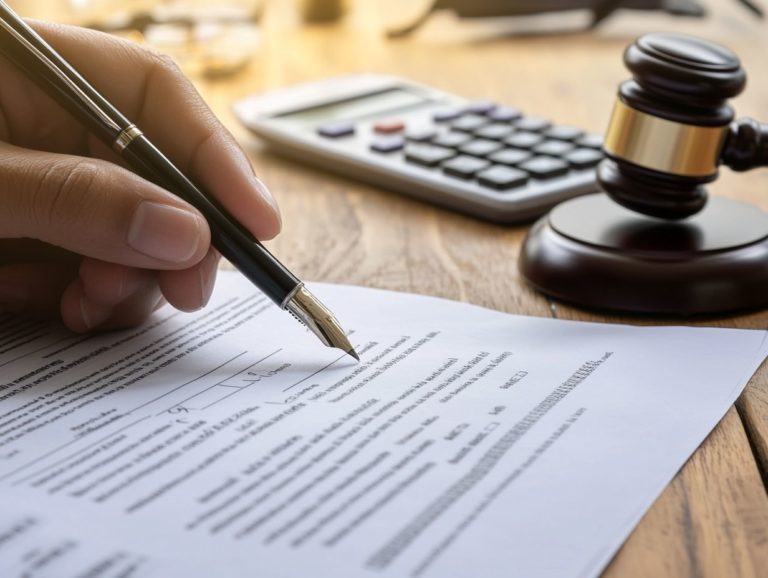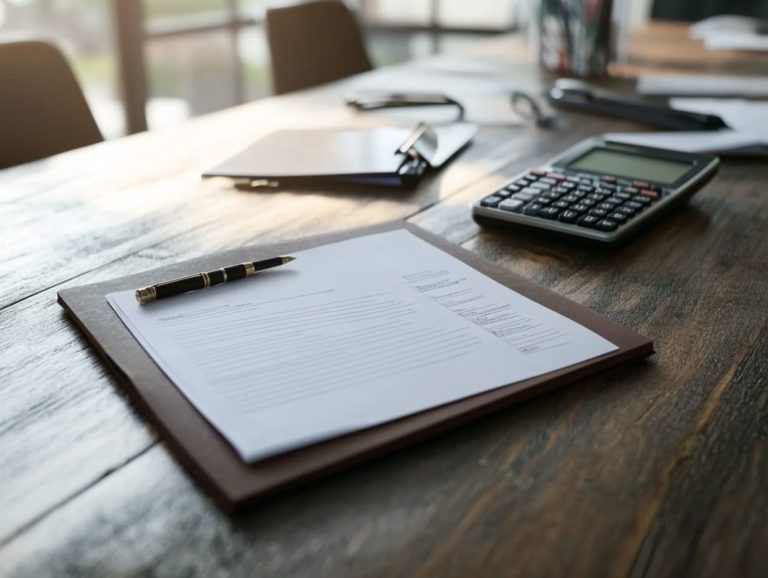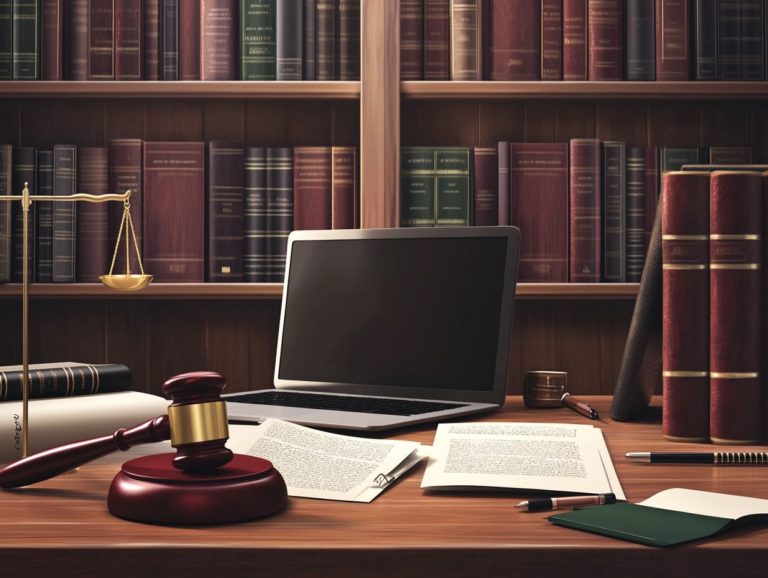How to Evaluate Defense Attorney Credentials
Going through the legal system can feel overwhelming, especially when you re facing criminal charges.
A skilled defense attorney is essential for protecting your rights and ensuring you receive a fair trial. So, how do you find the right one for your needs?
Let s explore how to find the right defense attorney for you! We will cover the essential roles and responsibilities of a defense attorney, the qualifications you should look for, and how to evaluate their credentials effectively.
We ll also highlight red flags to watch for, empowering you to make an informed decision on your legal journey.
Contents
- Key Takeaways:
- Understanding the Role of a Defense Attorney
- Qualifications to Look for in a Defense Attorney
- Assessing a Defense Attorney’s Credentials
- Red Flags to Watch Out for
- Frequently Asked Questions
- How can I verify a defense attorney’s credentials?
- What other qualities should I look for in a defense attorney besides credentials?
Key Takeaways:

- A reputable defense attorney should have a strong education and experience.
- Check their background, consult past clients, and verify their licenses.
- Watch out for red flags like a history of misconduct.
Understanding the Role of a Defense Attorney
Understanding the role of a defense attorney is crucial for anyone navigating the complexities of the criminal justice system. These legal advocates are dedicated to protecting their clients’ constitutional rights.
A skilled defense attorney, such as Stephen Cooper in Woodland Hills, California, works diligently to ensure that criminal defendants receive fair treatment and strong representation throughout their cases.
By using their legal knowledge and negotiation skills, they strive for the best possible outcomes. Their responsibilities extend beyond simple representation; they focus on building a strong relationship with clients based on trust and transparency.
What Does a Defense Attorney Do?
A defense attorney plays a vital role in the criminal justice system, providing essential legal representation to individuals facing criminal charges while advocating for their rights and interests.
They carefully examine police reports to find inconsistencies and potential breaches of due process, ensuring that every aspect of the case is thoroughly reviewed for your benefit.
Their role goes far beyond courtroom appearances; they develop strategic negotiation tactics for plea deals, which can be crucial in minimizing sentences and avoiding the unpredictability of trials.
In the courtroom, the defense attorney acts as your primary advocate, presenting compelling arguments and evidence that support your case. Their legal expertise is vital in navigating the complex landscape of criminal law, highlighting the importance of having skilled representation when facing serious allegations.
Qualifications to Look for in a Defense Attorney
When searching for a qualified defense attorney, it’s important to assess their qualifications and specialized expertise relevant to your criminal case.
These factors can significantly affect not only the outcome of your case but also your overall experience within the criminal justice system.
Education and Training
A successful criminal defense attorney embarks on a rigorous journey that begins with comprehensive education and training. This starts with earning a law degree from an accredited law school, leading to your law degree, known as a Juris Doctor, and passing the bar exam specific to your state, such as the New York Bar.
After securing your J.D., it s time to prepare for the bar exam. This process demands an in-depth understanding of state laws and legal principles and often requires months of dedicated study. Once you pass the exam, many choose to pursue additional certifications in specialized areas like criminal law, which not only enhances your credentials but also attracts potential clients.
Further training, such as attending legal workshops, participating in internships with experienced defense attorneys, or joining professional organizations, can be invaluable. Each of these steps improves your legal expertise and understanding of courtroom dynamics, essential for developing effective defense strategies.
Experience and Track Record

The experience and track record of a defense attorney are vital indicators of their capability to handle complicated criminal cases effectively. They are crucial for securing favorable outcomes for their clients.
A seasoned attorney, rich in criminal law experience, brings invaluable knowledge of legal procedures and a deep understanding of courtroom dynamics. Their history with similar cases shapes their reputation. A proven record of achieving results, whether through trial verdicts or plea negotiations, builds confidence in clients and colleagues.
As you evaluate an attorney’s past experiences with specific charges, you gain insights into their strategic thinking and adaptability in high-pressure situations. This understanding is essential in a field where every decision can significantly impact a client’s future.
Specialized Skills and Knowledge
Specialized skills and knowledge are essential for a defense attorney navigating the complex criminal justice system. Your ability to speak up for your clients’ rights is paramount.
Crafting a tailored defense strategy for each case is vital for achieving favorable outcomes. This requires a solid grasp of the law and a keen awareness of local legal standards, which can vary widely by jurisdiction.
Strong interpersonal skills are vital for building trust and rapport with clients. This ensures they feel supported throughout the legal process.
Such relationships form the bedrock of ethical practice, fostering open communication. This environment enables you to make informed and strategic decisions.
Assessing a Defense Attorney’s Credentials
Evaluating a defense attorney’s credentials is essential for securing strong legal support for your criminal case.
Their background, experience, and client testimonials offer invaluable insights into their capabilities. This allows you to make an informed decision that aligns with your needs.
Reviewing Their Background and Experience
Reviewing the background and experience of a defense attorney is crucial for determining if they are the right fit for your criminal charges. It helps you understand their approach to legal practice.
To conduct thorough research, delve into their legal practice history. Note their years of experience and any notable cases they’ve managed. Identifying their areas of specialization is equally important, as expertise in specific fields can significantly impact your case’s outcome.
Seeking their overall reputation among peers and clients can provide valuable insights into their professionalism and ethics. Client testimonials often reveal the attorney’s communication style and dedication. Previous case results highlight their track record of success and ability to navigate complex legal challenges.
Consulting with Past Clients
Consulting with past clients can provide invaluable insights into a defense attorney’s effectiveness and approach. This dialogue can illuminate client satisfaction and reveal the attorney’s ability to advocate successfully.
Diving into client testimonials can help identify patterns in communication skills and responsiveness that online reviews may not reflect. These firsthand accounts often showcase the attorney s dedication to maintaining a transparent and supportive relationship throughout the legal journey.
Understanding how an attorney addresses client concerns and navigates complex legal challenges gives you a clearer picture of what to expect. This diligence will empower you to make a confident decision quickly!
Verifying Licenses and Certifications

Verifying a defense attorney’s licenses and certifications is a vital step in ensuring you re working with a qualified professional who adheres to the ethical standards of criminal law.
This process usually involves checking with the relevant state bar associations, which keep complete and current records on each attorney’s licensing status and any disciplinary actions.
These associations also detail the specific areas of practice for each attorney.
Many states have criminal defense organizations dedicated to high standards. These organizations serve as valuable resources for confirming an attorney’s credentials.
As someone seeking legal representation, it s essential to ensure that your chosen attorney is authorized to practice in your jurisdiction. This significantly influences the effectiveness of your defense strategy and your overall legal outcomes.
Red Flags to Watch Out for
Identifying red flags when selecting a defense attorney is crucial. These warning signs can guide you in avoiding disreputable attorneys who might jeopardize your rights or the outcome of your case.
Warning Signs of a Disreputable Defense Attorney
Warning signs include unethical practices, poor client communication, and a lack of transparency regarding case strategies and fees.
If you ever feel pressured to make hasty decisions without fully understanding the implications, that s a red flag you shouldn’t ignore.
When an attorney is unresponsive ignoring your emails or failing to return your calls it raises serious questions about their commitment and reliability. A reputable legal professional should engage with you on every aspect of your case, discussing strategies and potential outcomes.
Maintaining robust and open communication is vital for building a trusting client-attorney relationship. It provides clarity and alleviates anxieties about the legal process, ensuring you feel supported every step of the way.
Potential Conflicts of Interest
Potential conflicts of interest may arise when your defense attorney’s previous engagements or relationships interfere with their ability to represent you effectively and ethically.
These situations can create challenges in prioritizing your needs, as the attorney might inadvertently favor past connections over your case.
Legal representatives must fully disclose any existing conflicts to ensure transparency and maintain trust. This ethical obligation preserves the integrity of the legal process and keeps your best interests at the forefront of every decision.
When priorities align, the likelihood of achieving favorable outcomes increases, underscoring the critical role of dedicated representation in the attorney-client relationship.
Frequently Asked Questions
How can I evaluate a defense attorney’s credentials?

Research their education, experience, and past results to evaluate a defense attorney’s credentials.
What should I look for in a defense attorney’s education?
When evaluating a defense attorney’s education, consider the prestige and reputation of their law school. Graduates from top law schools are often seen as more credible and knowledgeable.
Is it important for a defense attorney to have specialized training or certifications?
While not all defense attorneys have specialized training or certifications, choosing one who does can be beneficial. This may indicate a deeper understanding of specific areas of law and give them an edge in defending your case.
What is a defense attorney’s track record and why is it important?
A defense attorney’s track record shows their past success. It’s crucial because it reflects their ability to defend clients like you. Look for an attorney with a high success rate in cases similar to yours.
How can I verify a defense attorney’s credentials?
You can verify a defense attorney’s credentials by checking with your state’s bar association. They maintain records of the attorney’s education, certifications, and disciplinary actions.
Online reviews can also provide insights. Don’t hesitate to ask for references from past clients.
What other qualities should I look for in a defense attorney besides credentials?
Along with credentials, consider the attorney s communication skills and availability. It’s crucial to choose an attorney you feel comfortable with.
You need someone who keeps you informed and involved throughout your case. This partnership can make all the difference in your legal journey!






